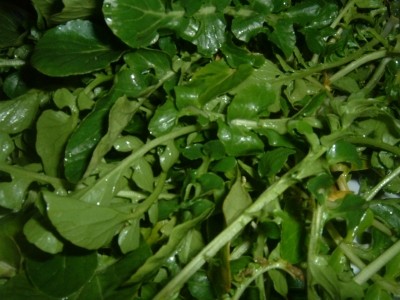Watercress may protect against DNA damage, cancer
blood cells, considered an important trigger in cancer development,
by 23 per cent, new research suggests.
The dietary trial, by researchers from the University of Ulster, using 60 healthy men and women (average age 33) eating a bowlful of watercress every day for eight weeks, also shows that blood triglyceride levels were also cut by about 10 per cent, while blood levels of the antioxidants lutein and beta-carotene rose by 100 and 33 per cent, respectively.
"Our findings are highly significant.
Population studies have shown links between higher intakes of cruciferous vegetables like watercress, and a reduced risk of a number of cancers," said lead research, Professor Ian Rowland.
"However, such studies don't give direct information about causal effects.
What makes this study unique is it involves people eating watercress in easily achievable amounts, to see what impact that might have on known bio-markers of cancer risk, such as DNA damage.
Most studies to date have relied on tests conducted in test tubes or in animals, with chemicals derived from cruciferous vegetables," he said.
The research, published in the American Journal of Clinical Nutrition , recruited 30 healthy men and 30 healthy women (including 30 smokers) and assigned them to eat bowlful of watercress (85g) daily for eight weeks.
The most benefits were observed in the smokers, said the scientists, which may have been a reflection of the higher levels of oxidative stress amongst this subgroup, since they had significantly lower antioxidant levels at baseline, compared to the non-smokers.
In addition to reducing DNA damage in the white blood cells (lymphocytes), watercress consumption was also associated with a 9.4 per cent reduction in DNA damage to lymphocytes when challenged with free radical generating hydrogen peroxide.
"Blood cell DNA damage is an indicator of whole body cancer risk, and, the results support the theory that consumption of watercress is linked to an overall reduced risk of cancer at various sites in the body.
The nature of the study group also means that the results are applicable to the general population eating a normal diet," explained Rowland.
In the UK alone, over 150,000 people die from cancer every year, with one in three people predicted to develop cancer at some stage in their life.
"The results support the theory that consumption of watercress can be linked to a reduced risk of cancer via decreased damage to DNA and possible modulation of antioxidant status by increasing carotenoid concentrations," concluded the researchers.
The research is inline with a wealth of science linking the consumption of five or more fruits and vegetables per day to a reduced risk of various cancers.
Indeed, only yesterday NutraIngredients.com reported on a Swedish study that reported a carotenoid-rich green leafy vegetable diet may halve the risk of stomach cancer.
The University of Ulster research was welcomed by Lynn Faulds Wood, UK TV presenter and a bowel cancer survivor: "The research from the University of Ulster is very interesting - it's great to know there are simple things that people can do - like eating watercress - which could help them avoid getting cancers like bowel cancer in the future," she said.
"It's great that the watercress farmers want to raise awareness of bowel cancer, the commonest cancer in Europe.
Thousands of people die unnecessarily of bowel cancer every year - with exercise and a good diet, many of them could live."
Sales of watercress in the UK are said to be on the rise, increasing by £18 million a year to £55 million.
The study was supported financially by The Watercress Alliance, made up of British watercress producers, Vitacress Salads, Alresford Salads and The Watercress Company.
Source: American Journal of Clinical Nutrition February 2007, Volume 85, Number 2, Pages 504-510 "Watercress supplementation in diet reduces lymphocyte DNA damage and alters blood antioxidant status in healthy volunteers"
Authors: C.I.R. Gill, S. Haldar, L.A. Boyd, R. Bennett, J. Whiteford, B. Butler, J.R. Pearson, I. Bradbury and I.R. Rowland













